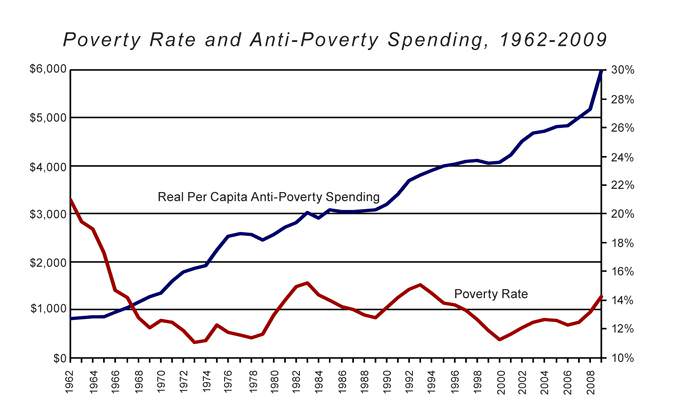Published December 5, 2012
Here’s a depressing chart that compares American public education spending to student performance since 1970. (Via, Cato Institute.)

And here’s a depressing chart that compares federal anti-poverty spending to the poverty rate since 1962. (Via, National Affairs.)

One could find lots of disheartening charts like these, but these two will suffice for our purposes. Consider them briefly; we’ll come back to them in a moment.
Last night, here in Washington, Congressman Paul Ryan gave the keynote address at the 2012 Jack Kemp Foundation dinner. Much of what he said was similar to the speech he gave at Cleveland State University during the presidential campaign (which I commented on at the time, here).
Ryan made three points last night I want to mention, one of which I want to highlight. First, “not every problem disappears through the workings of the free market alone.” Second, “Government must act for the common good.”
And then there is Ryan’s third point:
There’s a vast middle ground between the government and the individual. Our families and our neighborhoods, the groups we join and our places of worship — this is where we live our lives. This is where the needs of each are most clearly recognized — and met. Communities shape our character. They give our lives direction. And they help make us a self-governing people.
This vast middle ground is where most of our public life takes place. It is where virtues (and vices) are learned; it is where our culture lives; it is where we learn (or don’t learn) to be a self-governing people. Prosperity and freedom don’t just happen; they have to be learned. Civil society — and the family especially — is where we learn them.
Unfortunately, civil society gets overlooked in most of our public discourse.
Here’s a rough sketch of how most, or at least many, Americans think about society: Government’s jurisdiction extends to public goods, while jurisdiction over private goods belongs to individuals. Public goods are administered by laws while private goods are regulated and distributed by “the market.” Arguments between liberals and conservatives usually arise over whether a given matter falls under private or public jurisdiction and therefore whether it is subject to law or the market.
This binary division of society-government/law vs. private/market-is profoundly inadequate to the reality of the human person because it fails to recognize those natural associations — “our families and our neighborhoods, the groups we join and our places of worship” — in and through which we learn and experience solidarity. In short, such a view considers the individual only in isolation from his “natural environment,” civil society.
A binary view of society is thus incapable of understanding — and therefore incapable of addressing — the true underlying causes of inter-generational poverty, the deterioration of the family, and failing education system. Crafting solutions to societal problems based on such a flawed view of society produces depressing real-world result like the ones graphed in the charts above.
Pope Benedict XVI warned about this binary view of society in Caritas in Veritate (Italic emphasis is original, bold emphasis is added):
When both the logic of the market and the logic of the State come to an agreement that each will continue to exercise a monopoly over its respective area of influence, in the long term much is lost: solidarity in relations between citizens, participation and adherence, actions of gratuitousness, all of which stand in contrast with giving in order to acquire (the logic of exchange) and giving through duty (the logic of public obligation, imposed by State law). In order to defeat underdevelopment, action is required not only on improving exchange-based transactions and implanting public welfare structures, but above all on gradually increasing openness, in a world context, to forms of economic activity marked by quotas of gratuitousness and communion. The exclusively binary model of market-plus-State is corrosive of society, while economic forms based on solidarity, which find their natural home in civil society without being restricted to it, build up society. The market of gratuitousness does not exist, and attitudes of gratuitousness cannot be established by law. Yet both the market and politics need individuals who are open to reciprocal gift.
This is, admittedly, one of the more awkwardly worded passages in any papal document I have ever read — what is a “quota of gratuitousness and communion?” — but it contains some essential and profound truths. If we think of society primarily in terms of government vs. market or state vs. individual we’ve already given away the game.
The point isn’t that markets and government aren’t important-they are, massively so. Nor is the point that the current “balance” between free markets and government regulation is either optimal or irrelevant — I happen to think balance currently tips very far in favor of government, with bad consequences. The point is that both the “logic of the market” and the “logic of the State” are inadequate for understanding human beings and human society.
Recovering a sense of the importance of civil society, which neither the market nor the state can account for, won’t make our social ills simply go away. Nothing I’ve just said offers a clear solution to our failing schools or ineffective anti-poverty programs. But it is a necessary step, for as long as our politics remains a tug-of-war between the government and market-and both sides of the political aisle are guilty of this — workable solutions will continue to elude us.
Stephen P. White is a fellow in Catholic Studies at the Ethics and Public Policy Center in Washington, DC and coordinator of the Tertio Millennio Seminar on the Free Society. Views expressed here are his own.











